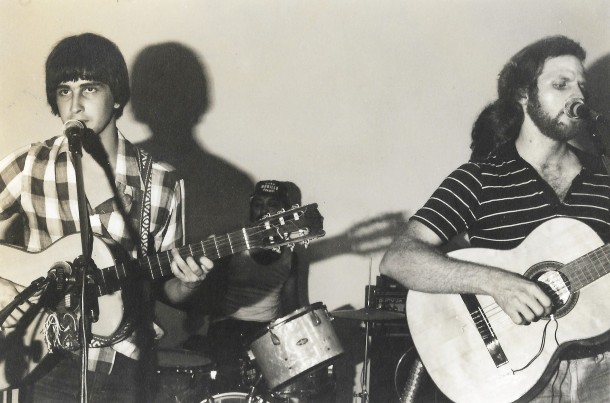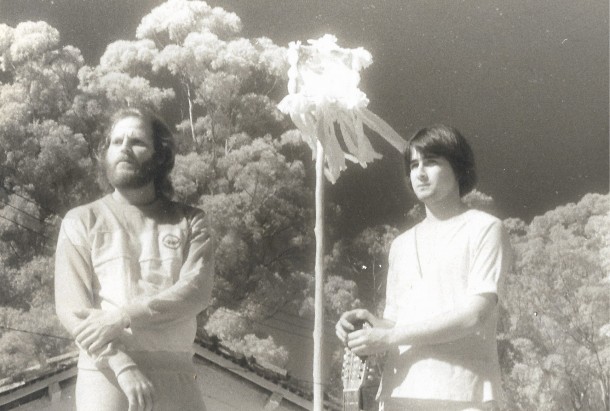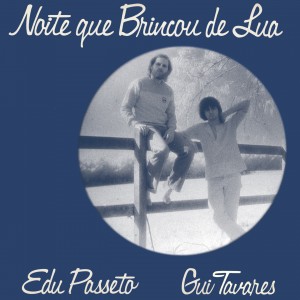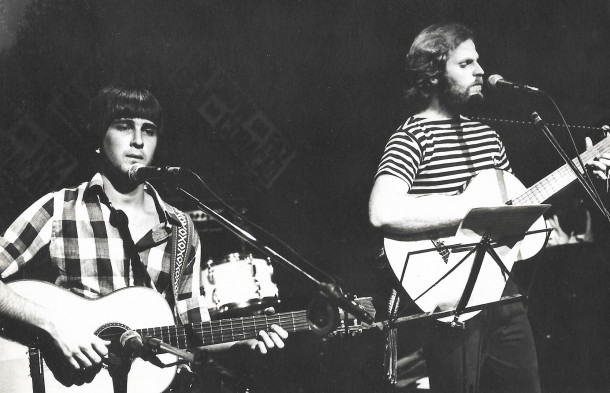



For many years Far Out have dedicated themselves to unearthing the unheard Brazilian gems. Their latest release is a reissue of Edu Passeto & Gui Tavares’ Noite Que Brincou De Lua: a super rare and largely unheard masterwork of MPB, somewhere between psychedelic folk, soul jazz, bossa nova vibes and oblique pop, with stunning arrangements and lush vocal harmonies. Time to go back to this story with one of these two protagonists, Gui Tavares.
Which part of Brazil where you born in and what were your musical influences when you started as musicians?
Edu Passeto was born in Pindorama, a very small town in the countryside of Sao Paulo state, and I was born Campinas, the second largest city of the same state. Edu moved to Campinas, where we met and worked together as musicians. As a young boy, I loved listening to Jongo Trio and the album ‘Jequibau’ by Mario Albanese and Ciro Pereira. I listened a lot to the music of French impressionist composers such as Claude Debussy and Maurice Ravel on the radio, as well as the music Milton Nascimento, Chico Buarque and Tom Jobim. Later as a teenager, I started to appreciate the music of composers such as Ivan Lins, Gilberto Gil and Caetano Veloso amongst other emergent composers. What influenced me the most when starting as a musician was the essence of the Clube da Esquina, Tropicália and Bossa Nova movements, mainly because of the sophisticated musical arrangements by Rogerio Duprat, Cesar Camargo Mariano and Wagner Tiso.
What is the story behind the ‘Noite que brincou de Lua’ record and more particularly the track “Sabia na palmeira”? Why is it so rare?
Edu and I composed around 250 songs together and played some of them at concerts and at many song contest festivals. After a couple of years on the road with our band, we decided it was about time to record an album, rather than only recording cassette tapes, which was common practice for independent musicians who didn’t have a lot of money to produce an album. With the help of the musicians from the band, we selected a few songs out of our vast repertoire. The track “Noite que Brincou de Lua” was an exception though, because it was composed only one month before we entered the recording studio.
We composed “Sabiá na Palmeira” in a moment of rare inspiration. It talks about the hope of seeing at dawn the ‘Sabiá’ bird (the song thrush) in the palm tree, which is a sign of a good day ahead. The song won and few song contest festivals we entered at that time and, because the original record was also sold abroad, this song gained international appreciation. This is a very dear song to me, so I recorded it again with a different arrangement in my 2001 album ‘Amigos & Friends’.

Sabia Na Palmeira
The record reached cult status among Brazilian collectors and is now being reissued by Far Out. How do you feel about it? Did you ever imagine this would happen?
When we released the album, we could never have imagined that in a distant future it would become such an appreciated record as it is today. Back in 1981, we suffered a lot because of the competition from big recording companies. We had to fight as independent musicians to find our space and earn a bit of projection and recognition as artists. In retrospect, I think the recognition among vinyl collectors worldwide and fans, is the best recompense one can have, so I feel very happy and grateful to them.
Does it offer you the opportunity to go back in studio?
It certainly does. I enjoy spending time going to studios to record my own compositions and of other artists. I’m currently working on an instrumental album with my own brand-new compositions and to me this is very exciting. What is even more exciting is that I kept a few cassette tapes from the time Edu Passeto and I were still working together. By remastering these records, where you can hear Edu’s voice, and by adding complementary instruments to the songs, we could potentially produce another Edu Passeto & Gui Tavares album.
After this record, how long did you continue to play together? When, why, did you stop this duet?
In 1986, Edu and I went our separate ways as I decided to move to Rio de Janeiro to seek new music adventures and to pursue my music career there. Edu preferred to remain close to his roots in Campinas where he lived with his new family. I was different to him in that respect as I’ve always been open to new experiences and opportunities. A few years later, we had a reunion and played together at a then traditional music venue called Mistura Fina in Rio de Janeiro. On that occasion, Edu played a few of his new songs and I played some of mine, and at the end of the show, we played songs from the album ‘Noite Que Brincou de Lua’. Then, we felt the enthusiasm of the audience and the musicians who played with us.
We continued with our individual careers, but we kept in touch whenever we could. We even tried to keep composing songs together, even though we were living in different places. Edu and I spoke on the phone several times and we created a second part for the song “Noite Que Brincou de Lua”, which is also featured in my second album. Sadly, Edu’s health deteriorated and he passed away in October 2008.

Descobrir
Tell us more about your career as musician. What happened after that record?
After training as a classical guitarist, in 1986 I earned a Bachelor’s Degree in Composition and Conducting from the University of Campinas. Then I moved to Rio de Janeiro, where I developed another way of life away from my family and old friends, a way different from the one I knew at my hometown, Campinas. There, I always worked with music and with independent and other music projects – I worked writing music for TV and theatre. I continued composing and forging new partnerships with other local musicians and having many opportunities for gigs and recording music.
It took a long time to record my second ‘Amigos & Friends’ as I was living between London and Rio. The album featured musicians such as Cláudio Nucci and Mauricio Maestro (Grupo Boca Livre), as well as of other special guests like Roberto Menescal, Jose Roberto Bertrami (Azymuth), Toninho Horta, Pedro Luís, and Sabá, a musician from Jongo Trio who also had participated and contributed in the recording of the album ‘Noite que Brincou de Lua’.
You decided to relocate in London in 2003. Why this choice? A brand new departure?
I lived in Rio de Janeiro for 17 years and I felt it was about time to create new horizons for myself. I think there are no borders to music and I chose to live in England because of its cultural diversity and openness to Brazilian music. Here I was able developed new projects and carry on working with the music of my country.
Are you still in touch with Brazilian scene? What do you think about all those new pop bands, as Dharma Lovers, or Rodrigo Campos?
I go to Brazil regularly to reconnect with my musician friends, to collaborate with them and to create new music themes and ideas. This makes me stronger. When some of these musicians come to London, I try meeting them and inviting them to play and record songs with me. In his recent visit to London, Filo Machado came to the studio with me to record one of the songs for my instrumental album, which I hope will be released soon.
About Dharma and Rodrigo: They are quite different from each other by nature, but they have an interesting musical language in my point of view. The Dharma Lovers have a characteristic that reminds groups with a strong rhythm of progressive rock, but with a spiritual language in their songs, while Rodrigo Campos has that tone of samba different from the traditions of Rio and reaches unexplored places in his songs. I had the opportunity to see him at the Barbican Center playing with Elza Soares. He is a modern and amazing artist.

Fifty years after, how do you look back the Tropicalism movement: was it the beginning of a new deal for Brazilian music, which permitted many musicians, as you, to record and spread their own views about pop culture?
The Tropicalism movement was very important for future generations as it represented a break with certain old music norms and barriers. This generated an outcry by the Brazilian purists and traditionalists. For musicians, however, new movements and their forms of expressions and ideas are always welcome. The ones that were able to sign record deals became famous and their songs big hits. There have always been independent artists that followed the same trends and directions of the new movements in Brazil.
In your record, there were some critics of social conditions. How do you look the recent political evolution of Brazil? Are we going back to 1970’s, in a certain way?
Both Edu and I had very strong political and social awareness and dreamed about the reconstruction of our country, with more social justice, distribution of income and opportunities and the desire for mutual understanding amongst people. The dictatorship started at a time when Edu and I were still young boys. That imposition affected us very much. In the lyrics of our songs, we spoke a lot about nature, Brazil’s indigenous people, about the urban way of living but also did a lot of social and political critique through our music.
I think Brazil is regressing back to 1964 in many ways unfortunately. It is a certain repetition of the process that triggered all the silence and censorship imposed on every Brazilian citizen and more specifically on artists in general, since they have the most impactful social language. We both expected it to be different. I hope it does not last as long as it did at that time. I try to preserve hope and perform actions aimed at consciousness and the future, which was our philosophy (mine and Edu’s).
Click here to buy from Far Out Recording